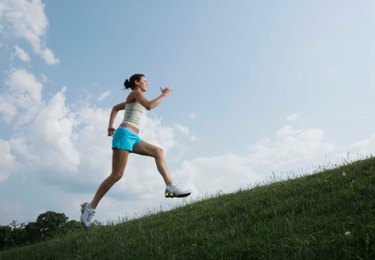
Although, as a runner, you might expect to feel soreness or pain in the legs or abdominal muscles, experiencing ovarian pain after a run can cause you to feel concerned. Pain in the ovaries might indicate an ovarian or another gynecological disorder, a medical issue unrelated to the ovaries or a dietary problem. Ovarian pain that persists, worsens with self-care or is accompanied by other symptoms requires immediate medical evaluation.
Features
Video of the Day
In addition to pain in the lower right and lower left area of the pelvis where the ovaries are located, women might also experience symptoms such as tenderness upon palpitation of the abdomen, bloating, gas or abdominal cramps. The pain might spread across the lower pelvic region and radiate down the thighs or into the hips and back. Some women might experience pain after every run, while others might experience pain in the ovaries following a run only once or twice per month.
Video of the Day
Causes
Pain in the area of the ovaries might result from a problem with the ovaries themselves, or with a nearby organ, muscle or ligament, which doctors call "referred pain." In some women, running can decrease blood flow to the intestines, described by the Running Times Magazine website as "angina of the abdomen." Runners who consume a diet rich in fiber might experience gas pain that mimics ovarian pain, and those who consume caffeine or become dehydrated during a run might develop abdominal cramping near the ovaries. Inflammation or arthritis of the pelvic bones can cause pain near the ovaries, which is aggravated by running, explains the website. Uterine disorders including fibroids and endometriosis can also cause lower pelvic pain after strenuous exercise. If the pain occurs about two weeks before the woman's period is due, the pain might result from ovulation. Women with ovarian cysts might also experience pain in the pelvis after strenuous exercise such as running. Rarely, ovarian pain experienced after running could result from ovarian cancer.
Treatments
Ovarian pain resulting from dehydration is treatable at home by consuming electrolyte-enhanced or sports drinks. Doctors might recommend over-the-counter pain relievers for pain resulting from arthritis, ovulation pain or uterine disorders; taking the medicine before a run might help lessen your pain while running. Doctors usually treat fibroids, cysts or endometriosis with surgical therapy, and ovarian pain resulting from ovarian cancer might require surgery, chemotherapy and radiation treatments.
Prevention
Staying well hydrated before and during a run and avoiding excessive intake of caffeine or dietary fiber might help prevent ovarian pain due to digestive problems. Maintaining a healthy weight and balanced diet might help prevent gynecological disorders that lead to ovarian pain. Stretching before and after a run, and alternating time spent running with periods of walking might also help prevent ovarian pain in runners with inflammation or arthritis of the pelvis.
Is this an emergency? If you are experiencing serious medical symptoms, please see the National Library of Medicine’s list of signs you need emergency medical attention or call 911.